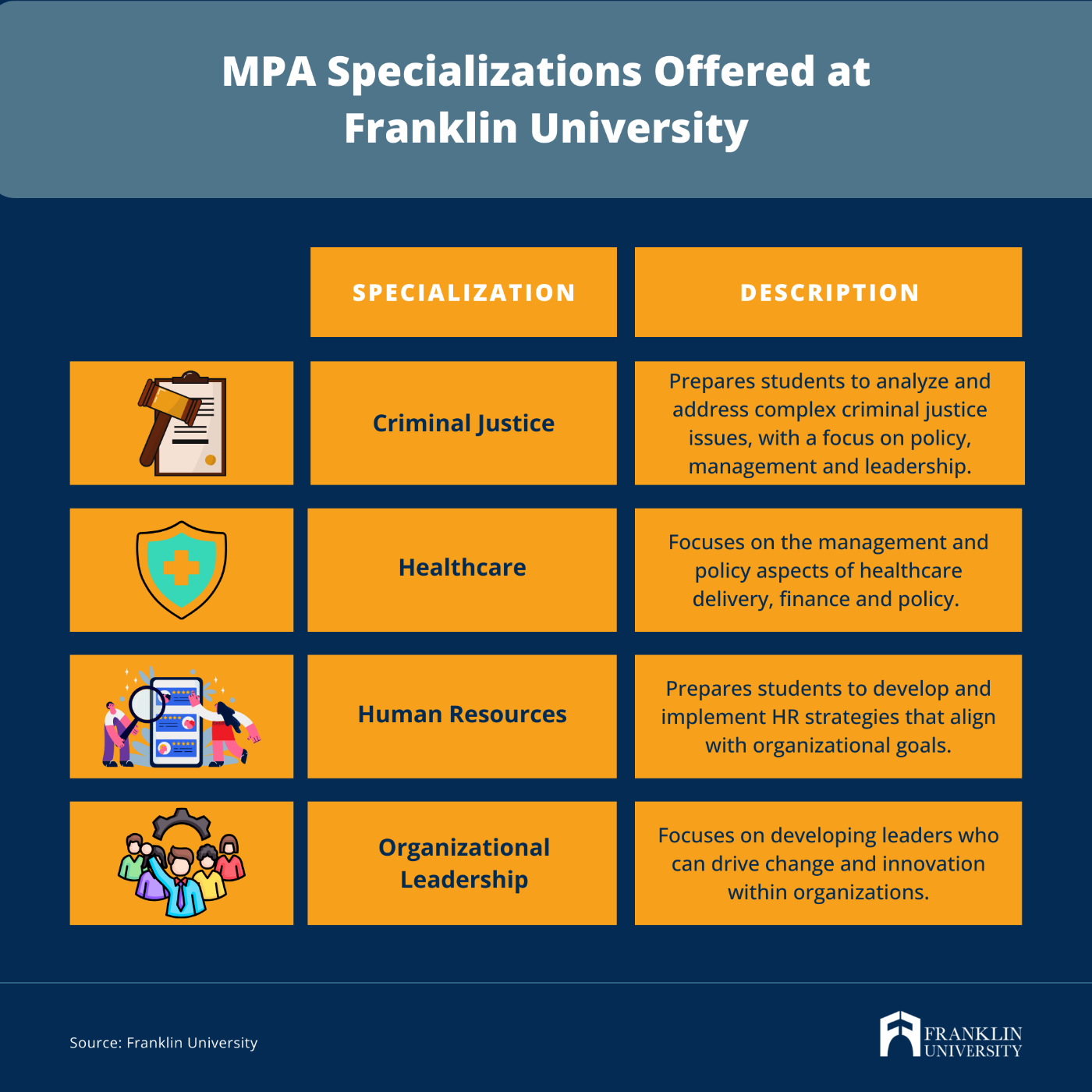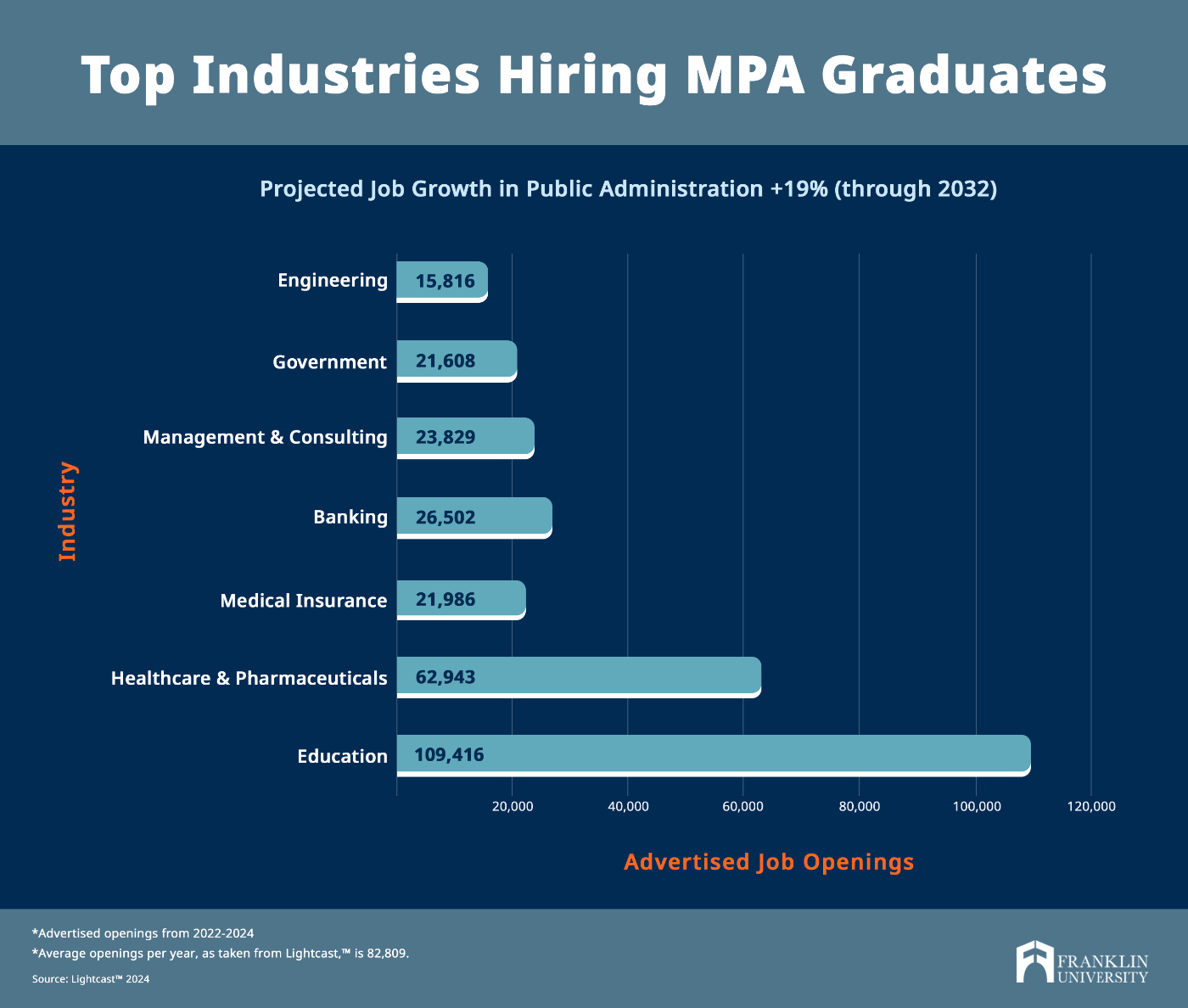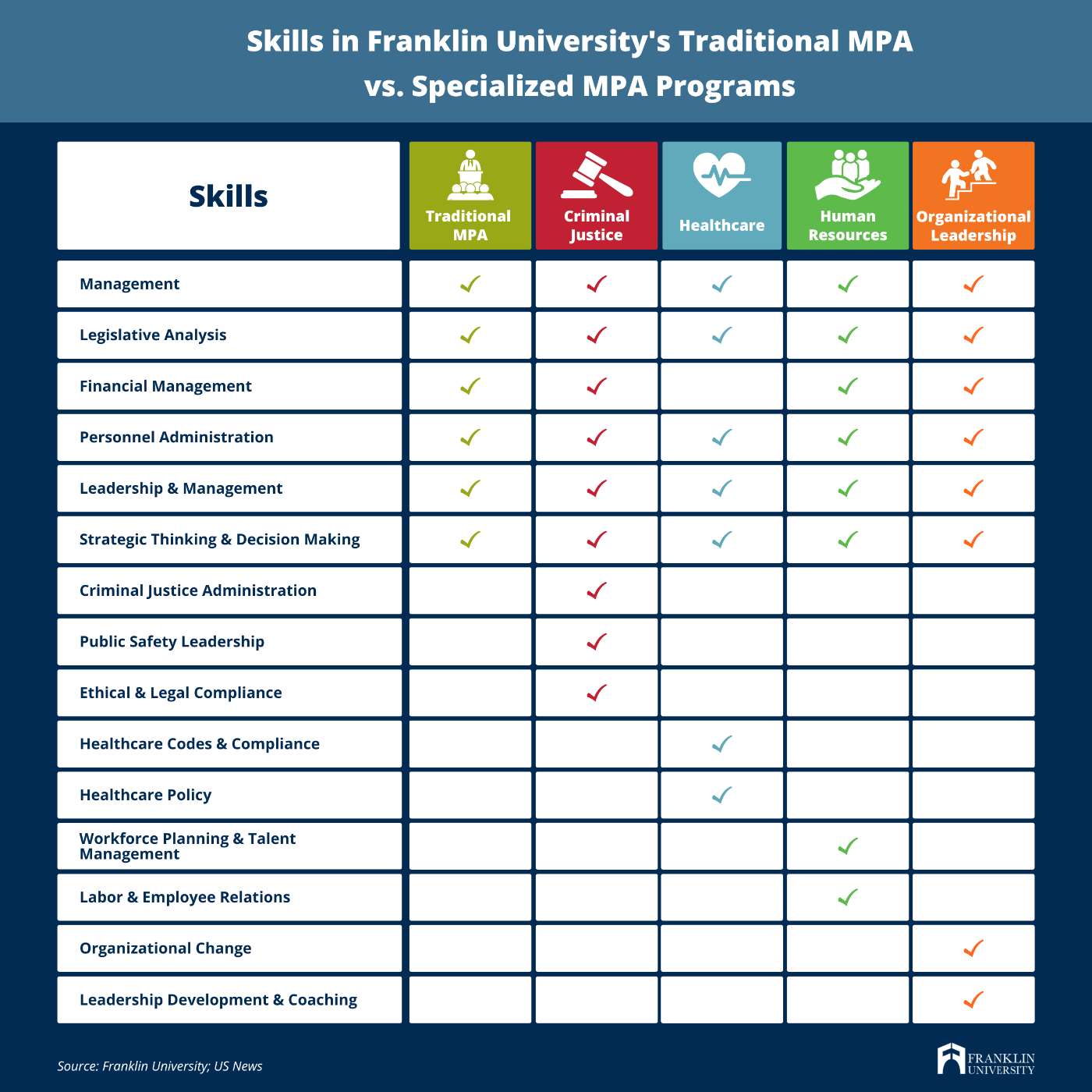Request Information
We're Sorry
There was an unexpected error with the form (your web browser was unable to retrieve some required data from our servers). This kind of error may occur if you have temporarily lost your internet connection. If you're able to verify that your internet connection is stable and the error persists, the Franklin University Help Desk is available to assist you at helpdesk@franklin.edu, 614.947.6682 (local), or 1.866.435.7006 (toll free).
Just a moment while we process your submission.

MPA Specializations: Find Your Fit
Public administration is more than a career; it’s a calling to serve communities and shape public policy.
Lightcast predicts that the field of public administration will increase by 19% through 2032, highlighting promising career prospects for years to come. This area is also where a Master of Public Administration (MPA) program becomes invaluable, equipping you with the skills and knowledge to excel in the many hubs of public administration.
However, the increasing complexities of public issues can require specialized knowledge to manage contemporary challenges effectively. As a result, specializations have become more prominent, making it essential to choose a public administration program that aligns with your career goals and interests.
The Importance of Specializations in Public Administration
Understanding the value of specialized education in the public administration job market cannot be overstated.
Dr. Wendy Eaton, Master of Public Administration program chair at Franklin University, notes that narrowing in on a specific area of expertise can be advantageous to those looking to stand out in a sea of applicants. Narrowing in can improve their ability to balance academic, professional and personal responsibilities.
In this way, focused MPA specializations enable you to target specific public administration areas such as criminal justice, healthcare, human resources and organizational leadership.
These specialized programs can help you develop expertise in areas critical to public policy and administration, making you a valuable asset to employers seeking specialized skills to tackle today’s multifaceted issues.
Know Your MPA Specialization Options

According to Dr. Eaton, choosing the right MPA specialization can be challenging, particularly for those uncertain about their career path. She also notes that it’s important you figure out what kind of job you want, areas you’d like to learn more about and/or what interests you before pursuing a specialized degree.
Exploring different MPA paths before committing to a program can help you identify the best fit for your career aspirations.
Criminal Justice
An MPA specializing in criminal justice focuses on teaching you the skills to manage, oversee and support criminal justice organizations. It includes a curriculum covering policies, laws, ethics, analysis and administration unique to the field.
Career paths typically include administrative roles in law enforcement, corrections and the court system, which can consist of popular career paths such as police administrator, court manager and correctional supervisor.
Common skills learned include criminal justice administration, public safety and leadership management, ethical and legal compliance, political advocacy, legislative and forensic analysis and financial management.
What matters most when choosing a master’s program? Compare features, benefits and cost to find the right school for you.
Environmental and Natural Resource Management
The environmental and resource management specialization, which focuses on preserving our planet, prepares you for roles in environmental policy, conservation and sustainability.
You'll learn to analyze environmental policies, approach environmental challenges, manage resources and plan for more sustainable communities. You'll also develop strategies for conserving and protecting natural resources, as well as mitigating the impacts of human activities on the environment.
There are ample career opportunities in this sector, from environmental policy analysts in local government to conservation agencies and sustainable development organizations.
Healthcare
Pursuing a healthcare specialization will deepen your understanding of healthcare-specific policies, operations and analytics.
You'll learn how to analyze and develop policies that impact healthcare delivery, as well as how to evaluate and improve healthcare programs. In addition, you'll gain more insight into complex policies that govern the healthcare industry, including federal and state laws, regulations and guidelines. This expertise will enable you to make informed decisions and drive positive change in the healthcare sector.
Career paths for graduates of the MPA in healthcare are diverse and plentiful. Some potential career paths include being a healthcare administrator, public health policy analyst, health education coordinator, or health services manager.
Human Resources
This program prepares you to effectively oversee the employee lifecycle, from recruitment and hiring to training and development to retention and separation. You'll learn how to successfully develop and implement HR initiatives that align with your organization's goals and objectives.
Through this HR specialization, you'll gain a deep understanding of the HR function, including labor laws, employment regulations, benefits administration and organizational development. You'll also develop skills in strategic planning, problem-solving and conflict resolution.
Upon completing this program, you’ll be equipped to work in various HR roles, including HR generalist, recruitment specialist, training and development manager and DEI specialist.
Nonprofit Management
An MPA in nonprofit management is designed to equip you with the skills and knowledge necessary to lead and manage nonprofit organizations and/or their individual branches. Nonprofit organizations play a vital role in addressing social, economic and environmental issues, and effective management is crucial to their success.
In this specialization, you'll gain a deep understanding of the unique challenges and opportunities faced by nonprofit organizations. You'll also learn skills such as strategic planning and management specific to the nonprofit sector, fundraising and development program evaluation and planning, volunteer management, communication and collaboration.
Common career tracks in nonprofit management include nonprofit leadership, fundraising coordination and community program evaluation.
Organizational Leadership
This specialization focuses on developing an authentic and effective leadership style, which is essential for inspiring and motivating teams to achieve their goals.
Throughout the organizational leadership specialization, you'll be encouraged to think critically and creatively, developing your skills in problem-solving, decision-making, coaching and collaboration. You'll also learn to leverage technology and data-driven insights to inform your leadership decisions.
Upon completing the organizational leadership specialization, you'll be well-equipped to take on leadership roles in a variety of organizations, including nonprofit, public sector and private sector organizations. This may include positions such as state agency director, faculty advisor, assistant city manager and chief administrative officer.
Public Policy and Management
The public policy and management specialization is an excellent choice for those who want to work in public organizations.
Through a focused curriculum, you'll gain expertise in public policies, policy analysis, program evaluation, public management, foreign policy, local government management and budgeting. This entails learning how to critically evaluate policy options, identify areas of improvement and develop evidence-based solutions to address complex problems in public policy settings.
These are valuable skills to have when pursuing a career in the public sector, where commonly pursued titles include policy analyst, program evaluator and budget analyst.
Urban Planning and Sustainable Development
If you're interested in community and economic development, a specialization in urban planning and sustainability may be the right MPA pathway for you.
Through this specialization, you'll develop a range of skills, including urban planning, community development and sustainability practices. In addition, you'll learn how to apply theoretical frameworks and conceptual models to real-world problems, using data analysis, visualization tools and geographic information systems to inform decision-making.
Combining these skills with a deep understanding of urban systems and sustainability principles will enable you to work on some of the most pressing challenges facing cities today. For this reason, commonly pursued career paths include urban planner, community developer and sustainability consultant.
Benefits of Specializing in Public Administration
Dr. Eaton notes that specialized MPA programs utilize many different methods to ensure students can benefit from the knowledge and apply what they learn to their avenue(s) of interest.
“Creative assignments like recorded presentations, infographics and mind maps enhance students' engagement and learning by fostering diverse skills such as visual communication, public speaking and creative thinking, beyond the monotony of weekly papers.”
With this comes additional pros upon graduation, such as:
- Increased Job Prospects. A specialized degree can make you a more attractive candidate in your area of expertise.
- Competitive Advantage. Go beyond the general pool of candidates by showcasing your niche skills.
- Enhanced Skills and Knowledge. Specializations allow you to deepen your knowledge and hone your skills in your chosen field.
- Greater Impact. Contribute more effectively to public policy and administration in your area of interest.
- Personal Fulfillment. Engaging in work you're passionate about can lead to higher job satisfaction.
- Increased Earning Potential. Specialized skills can often command higher salaries.

Join the Ranks of Public Administration Leaders
Franklin University's MPA specializations are designed with the current demands of public administration in mind.
With MPAs available in criminal justice, healthcare, human resources and organizational leadership, you'll be equipped with relevant, up-to-date skills to excel in the specialized career of your choosing.
Ready to make a difference? Learn more or apply to a specialized MPA program today!






